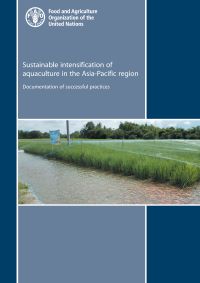Small farmers: Better practices and challenges in moving towards sustainability
4 March 2013 | C.V. Mohan and Brian Davy | 3545 views | .mp4 | 29.61 MB | Better management practices, Livelihoods, gender and social issues, Environment and Sustainability
The activities covered in this presentation form part of regional efforts in India, Thailand and Indonesia in moving aquaculture towards more sustainable farm practices.
The European Commission, under the 7th Framework programme (FP7) Cooperation Theme 2: Food, Agriculture, Fisheries and Biotechnologies, is funding a project the “ASEM Aquaculture Platform”, coordinated by Ghent University and involving nine participating European and Asian organisations. Its aim is to develop a strong ‘Community of Practice’ to reconcile ecosystem and economic system demands to promote and consolidate sustainability in aquaculture development in both regions. NACA will play a key role in the project’s planned initiatives, including leading Work Package 2, “Development and validation of commodity-specific Better Management Practices (BMPs) for smallholder farmers in the Asia-Pacific region”. This work pack age focuses on promoting wider adoption of BMPs for key aquaculture commodities in NACA member countries, thereby contributing towards sustainability of this important food production sector and improving livelihoods of small farmers. The focus is on assessment of the impact of BMP implementation and developing scale-up strategies at national and regional levels. This repor t summarises our detailed assessment of recent work on the impacts of shrimp BMP programmes, including technical, social, economic and environmental dimensions, in the Asian region. Challenges and opportunities for scaling up are also identified.
Cluster farming is introduced as one such opportunity, involving collective planning, decision making and implementation of crop activities by groups of farmers organised as a cluster, using a participatory approach to accomplish their common goals (reduce risks, maximise returns, and move towards sustainability). A successful example of the potential of cluster development is offered by the National Center for Sustainable Aquaculture (NaCSA) experience in India. NaCSA is scaling up and now has over 700 clusters, many of which have formed cross-linkages for knowledge sharing with other clusters and extended linkages to other sectors (e.g. milk, pineapple and other fruit) and across Asia (e.g. Thailand, Viet Nam, and Indonesia). Such networks might be expected to offer important support to small-scale farmers in meeting the new challenges presented by a global marketplace. Clusters are expected to facilitate access to credit and insurance, give voice to farmers in policy debates, and help farmers meet increasingly stringent compliance burdens.
The example of the Sam Roi Yod shrimp farmer cooperative in Thailand was also presented as a success story involving local and European partners. The cooperative established and operates an Internal Control System (ICS) and maintains records for internal and external audit. It has already reached compliance with the Thai Good Aquaculture Practice (GAP) standards as well as the requirements of the buyer (Marks & Spencer). Its produce is exported to the EU and reaches a higher price than would be possible in the domestic market. Fair Trade Certification is also now in process.
In Aceh, Indonesia, a major post-tsunami reconstruction initiative has been under way, including rehabilitation of the aquaculture sector, supported by various donors under the “Build Back Better” programme. The initiative is based on BMPs and the cluster management approach, and testing a number of farmer support mechanisms. Four Aquaculture Livelihood Service Centres (ALSC’s) have been established in Bireuen and Aceh Utara, and a specialised Aceh Aquaculture Communication Center (AACC) provides advice and information services for the new ALSCs. An Aceh Development Society (ADS) has also been set up. To date, over 2 000 participating small farmers are farming shrimp and milkfish. Market links to Japan and the United Kingdom are being established, and Fairtrade certification is in progress.
The NaCSA experience in small-scale farmer innovation parallels lessons learned in other sectors. The experience leads us to a broader perspective on issues- for example in regard to who and what should change, as well as a shift towards new approaches to organisational change, the role of clusters as farmer support mechanisms, network organisations, private sector partnerships, and new links across value chains as well as vertically (local, national, regional and international levels).
In conclusion, the evidence shows that if farmers can see benefits, particularly long-term benefits, they will change their farming practices under a variety of conditions and drivers. With provision of adequate support and services (“hand holding” combined with an expanding toolbox) they can be part of the solution in moving aquaculture towards sustainability. Continued broad-based research is suggested to document these processes, capturing and sharing lessons learned including organisational lessons.
Creative Commons Attribution.
